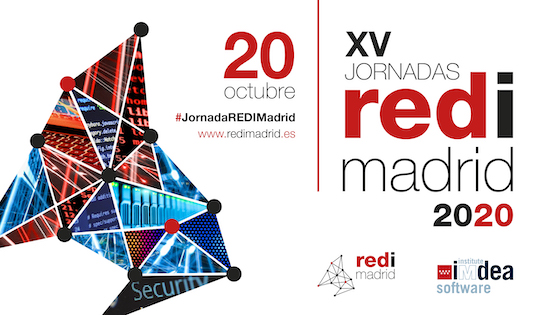The 2020 edition of the REDIMadrid Conference has been completely virtual due to the COVID-19, but efforts have been made to make the conference very interesting, shorter in order to continue to attract a very determined audience.
Blanca Gutiérrez, Communication Manager of the IMDEA Software Institute, began the conference with a brief introduction and was followed by Manuel Carro, Director of the IMDEA Software Institute, who gave the conference’s opening speech.
Manuel, spoke about the origin of the network as well as high-speed networks that offer services to the educational and scientific community. In this sense, he stated that teleworking, forced by the arise of the pandemic, would not have been possible without fibre optic networks such as REDIMadrid. “The leap into the digital world and into education has come to stay despite the fact that regulations must also be updated” he confirmed.
“The state of REDIMadrid. Present and Future” was the first presentation, given by César Sánchez, director of REDIMadrid and Associate Research Professor at the IMDEA Software Institute, in which he commented that REDIMadrid is the last mile of the RedIRIS network in Madrid as part of the European GEANT network.
David Rincón, Coordinator of REDIMadrid, spoke about the Denial of Service (DDoS) attacks in the educational environment that have resulted with the tendering of a software to mitigate these attacks. “This is a new service offered by REDIMadrid which has had to be adjusted to the change in profile caused by COVID-19” he said of the GENIE tool. The traffic is mitigated before it reaches the institutions, so the network’s clients are protected.
The following talk: “The Madrid Quantum Network”, was given by Vicente Martín, professor of the Computer Science Faculty, UPM. His presentation was based on the quantum network that is being deployed in Madrid as part of the OpenQKD project. “Quantum computing is characterised by the basic information unit Qubit. Qubits communication consists of the propagation of photons and, when these are in transit, they cannot be touched without modifying their characteristics, for this reason they cannot be intercepted in transit and this is what gives the technology total security” confirms Vicente.
After the talk on quantum communications came the WhiteBox colloquium in which the following took part: Diego Nuevo, Network & Data Center Arquitect at Axians; Víctor López, technology expert in the General Directorate of Systems and Networks at Telefónica; and Óscar Rebollo, engineer at REDIMadrid. The situation of integration, costs and support of the whiteboxes was discussed, as well as the state of penetration of this equipment in the clients’ networks, exemplified by the TIP project (Telecom Infra Project).
The conference continued with the talk “The Lockdown Effect: Implications of the COVID-19 Pandemic on Internet Traffic”, based on a publication that will be presented soon and whose authors are Juan Tapiador, professor of computer science at UC3M, and Narseo Vallina-Rodríguez, Research Assistant Professor at the IMDEA Networks Institute. REDIMadrid has contributed to this study by providing traffic data.
The next to participate was Marta Vázquez, from INTECCA-UNED, who presented the AVIP application. “From COVID-19, videoconferencing has become compulsory at the UNED and thanks to the application’s scalable architecture, it has been possible to absorb the large increase in traffic, which has peaked at over one hundred thousand users on some days”.
And finally, Gibran Gómez, researcher at the IMDEA Software Institute, gave a talk on “Malicious TLS Traffic Detection using Unsupervised Machine Learning”. According to Gibran “there are few protocols that send clear information, so attacks on protocols that use encryption such as TLS are beginning to increase. Machine Learning (ML) techniques are used to detect and combat MITM and malware attacks and the system developed detects them and generates alerts”.
